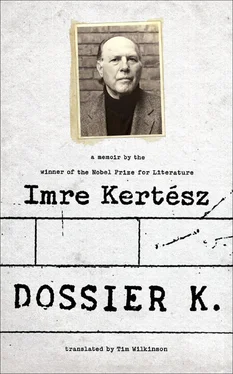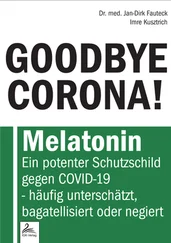An intriguing story …
Intriguing as intriguing goes; it’s just that I could have gone crazy if I couldn’t have drawn on it as fiction. As it was, it fitted in superbly with the novel’s improbable reality: György Köves can attribute his escape to an incomprehensible absurdity in the same way that the cause of his death would have been an incomprehensible absurdity. An explanation can be found for both cases, but those explanations call for further explanations and so on ad infinitum , back to the start of history or the Creation, if you will. As for me , the person who lived through it all yet used the experiences as the raw material for a novel —I am able to vanish nicely and comfortably between fiction and the facts that are called reality.
And tread on toward the next novel .
Yes, with the feeling that I may have written a novel but I have solved nothing. The riddle of the world has remained just as tormenting a thorn as it was before.
I know you are reluctant to speak about your camp experiences, but you mentioned just before that the alteration of your record card in Buchenwald would have called for the covert collaboration of several individuals. Who might those individuals have been?
I don’t think there’s much point in spending much time on the structure of Buchenwald camp. Look, every concentration camp was different from all the others — such was the “univers concentrationaire.” From a certain point of view (but certainly not mine), Buchenwald in 1944–45 was one of the “less rigorous” camps. That was a result of the ruthless battle that the “red triangle” political prisoners had fought for many years against the “green triangle” criminals. It was a matter of who controlled the internal administration of the camp. The internal administration in its entirety was run by the prisoners, so the ones who had charge of the administration held the power. Since the “red triangle” prisoners were generally more intelligent, more astute, and better organized than the “greens,” they gradually gained control of the office that handled job allocation and the transports, and in that way they slowly managed to free themselves of the criminal elements by channelling them to auxiliary camps, allocating them to Commandos doing the most unpleasant work — but maybe it’s better I don’t go into the details. As a result, though, the political prisoners were able to do, and indeed did, quite a lot above all for the children, for whom otherwise certain death would have waited in the typhus-ridden barracks of the so-called Little Camp that was opened for the anonymous masses of Hungarian Jews in 1944. The long arm of the politicals probably reached as far as the ramp, where they tried to fish out and salvage to relative safety a few lucky devils among the human debris of the transports.
So there is a rational explanation, after all, for the process that seemed so irrational to you at the time .
Even today it seems every bit as irrational, because if I try to accept the rationality of the whole process that in the early winter of 1944–45 landed me, half-dead, in an icy puddle on the concrete of a Buchenwald unloading bay, there is still no way that I can consider it rational that I, of all people, and not someone else should have been rescued from there. If I were to accept that as being rational, I would also have to accept the notion of providence. But then if providence is rationality, why did it not extend to the six million others who died there?
Nobody can accuse you of ducking awkward questions, as indeed is already very clear from your published work. But tell me, how can you live facing those questions?
Like a gambler. I like playing for big stakes, and I am quite ready to lose it all at any second. As we must all die, we have the right — even a duty — to think boldly.
There are quite a lot of people who would say that your way of thinking is pessimistic .
I don’t know what that means: I wouldn’t call dodging the ultimate questions optimism but plain cowardice. I can understand it, but an optimist has to die just as much as a pessimist. Whether we yield to death blindly or confront it head-on doesn’t matter in practice. I would prefer to confront it head-on because to me that signifies a fuller life; ultimately it gives me more pleasure. You could say I am a hedonist.
Not a moralist?
No way! The age of the great moralists — of Montaigne, La Rochefoucauld, and so on — has long passed. Since Auschwitz it has become redundant to make any judgments about human nature. The way of the moralist nowadays leads straight to mass movements, and that is more than a little problematic, besides which it is boring. But leave them be: let them believe that there is such a thing as a just dictatorship without death camps, where everyone is obliged to be happy. To my way of thinking happiness means something else — that’s all there is to it.
What about justice?
Truth is no longer universal — that’s a grave fact, but it must be acknowledged. Standing up for oneself: that’s the hardest, it always was. That’s precisely what the moralist runs from. Our era does not favour the preservation of the individual; it is simpler to surrender ourselves to salvational ideas than stick to our own unique and irreproducible existence, to choose our own truth rather than the truth. But let’s not get into this.
Let’s carry on with the chronicle. What is your memory of your liberation?
I described it in Fatelessness . Those were heady days for us. Every day the order would be given out that Jews were to assemble on the Appellplatz. Death marches set off from the camp to other camps that lay further afield. Every night there was an air raid, and along with the bombs we were able to pick out approaching artillery fire. Over the last few days SS boots thudded on Lager thoroughfares, rifle shots were audible. Finally, around noon one day, the order was bellowed from the loudspeakers that all SS personnel were to leave the camp, “without delay.” A few hours later the roar of General Patton’s victorious tanks could be heard in the distance. By that night a Hershey bar and a Lucky Strike cigarette had flown onto every bed; in the kitchens the cooks were preparing a thick goulash. We greedily tucked the soup down, but ingesting the heavy food was deadly for more than a few. That was April 11th. The date was murmured at every hand. The loudspeakers, which up till then had relayed the orders of the SS, were switched to the BBC radio broadcasts, which gave news about the liberation of a Buchenwald concentration camp that lay close to the city of Weimar. It was strange to be in Buchenwald listening to the emotional and astonished reports that were made about Buchenwald. It was strange to return of the world of humankind. The rest is just anecdotal.
In Fatelessness György Köves rings the doorbell to the Fleischmanns’ home and demands to have his fate given back to him .
That’s right. There’s no denying that I too rang some doorbell, but I wouldn’t swear that my one-time neighbours really were called Fleischmann and Steiner. At the home in Baross Street someone else opened the door: that was the overture to the reality that I had returned to a changed world, but the experience of seeing a stranger at the door instead of my father or stepmother was like a seismic tremor at the time.
Why did you return to Baross Street rather than to Zivatar Street?
When I went away, Baross Street was the status quo, and when I got home I had no way of knowing that my father had died.
True, in the novel that’s something you learn from old Fleischmann and Steiner .
Читать дальше












